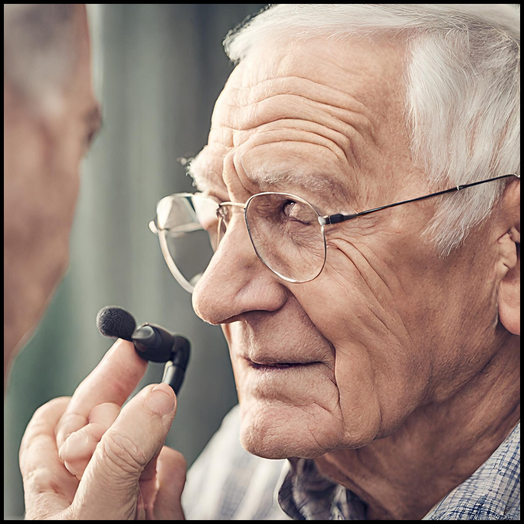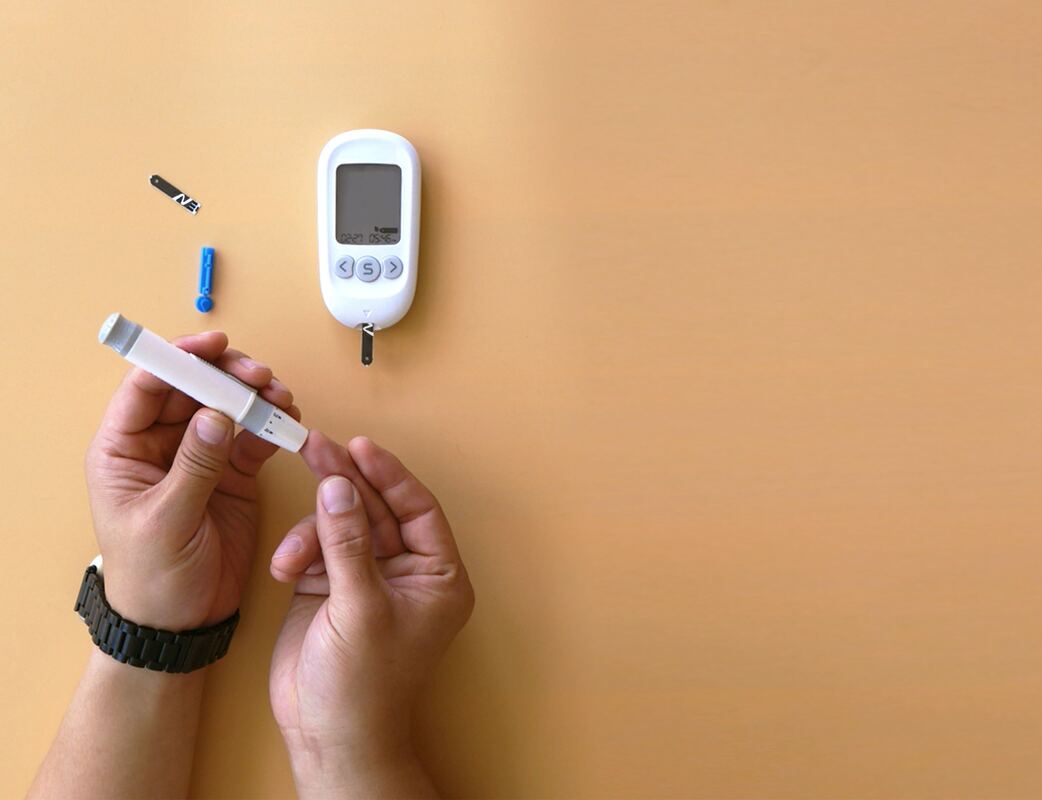|
In our busy lives, stress and anxiety is common. We may not realize how anxiety can impact our physical health, including our hearing. This blog post explores the connection between anxiety and hearing loss. It shows how these two issues can affect our health. Understanding Anxiety's Influence on HearingA quiet evening, and you find yourself straining to hear the gentle hum of your surroundings. For individuals grappling with anxiety, this scenario isn't uncommon. Anxiety, characterized by persistent worry and tension, can manifest in various physical ways, including heightened sensitivity to sound and difficulty concentrating amidst background noise. Research has found that prolonged stress and anxiety can lead to physical changes in the body. These changes can impact heart health and weaken the immune system. Surprisingly, one area significantly affected is our auditory system, responsible for processing sound waves into meaningful information. The Science Behind the ConnectionResearch shows that long-term stress, often seen in anxiety disorders, can worsen hearing problems or lead to them. Long-term stress, commonly found in anxiety disorders, can exacerbate hearing issues or even be the cause of them. The inner ear is a fragile organ that turns sound vibrations into signals for our brain. Stress hormones like cortisol can easily affect it. Dr. Sarah Lee, a renowned otolaryngologist, explains, "The inner ear relies on a finely tuned balance of neurotransmitters and blood flow. When stress hormones flood our system, they can disrupt this delicate equilibrium, potentially leading to temporary or even permanent changes in hearing sensitivity." Coping Strategies for Managing Anxiety & Hearing ChallengesDealing with anxiety-related hearing issues can be scary. However, there are 3 ways to reduce symptoms and improve your well-being.
In ConclusionUnderstanding the connection between anxiety and hearing loss is important for maintaining good hearing and overall health. Taking steps to reduce stress and anxiety can help protect your hearing and improve your quality of life. By taking steps to reduce stress and anxiety, you can protect your hearing and live a healthier, happier life.
If you feel overwhelmed or notice changes in your hearing, it is important to address anxiety. Taking care of your mental health is crucial for your ability to hear well. Remember, your well-being matters—take steps today to nurture both your mind and your ears. Contact Northumberland Hearing Center to schedule a free consultation.
0 Comments
Understanding the DifferencesIn recent years, the landscape of hearing aids has evolved significantly, offering consumers more choices than ever before. People who have trouble hearing have to choose between OTC ( Over-the-Counter) and traditional hearing aids . OTC hearing aids are available without a prescription, while traditional hearing aids require a prescription from an audiologist. It is up to individuals with hearing loss to decide which type of hearing aid is best for them. Understanding the differences between these options is crucial for making an informed decision that suits individual hearing needs. What Are OTC Hearing Devices?Manufacturers design OTC hearing aids for people with mild to moderate hearing loss. They can be bought without a prescription or professional fitting. These devices aim to be more affordable and accessible than traditional ones.
Prescription (Traditional) Hearing Aids: What You Need to KnowPrescription hearing aids, on the other hand, are custom-made devices prescribed and fitted by licensed professionals. We personalize them to meet the wearer's specific needs after thoroughly evaluating and assessing their hearing.
Key Considerations When Choosing Between Prescription & OTC DevicesWhen deciding between OTC and prescription hearing aids, you should take several factors into account.
Regulatory and Safety ConsiderationsIt's essential to note that OTC hearing aids are regulated by the FDA to ensure they meet safety and effectiveness standards. However, they may not provide the same level of customization and monitoring as prescription devices. ConclusionIn summary, deciding between over-the-counter and prescription hearing aids depends on personal hearing needs, preferences, and budget. While OTC devices offer accessibility and affordability, prescription hearing aids provide customized solutions and professional guidance. Consulting with a licensed hearing aid specialist can help individuals make an informed decision that aligns with their specific hearing requirements. Whether opting for convenience or customization, the goal remains the same: improving quality of life through enhanced hearing.
By understanding the differences outlined above, individuals can navigate the diverse options available in the hearing aid market and select the best solution for their unique circumstances. Whether it's OTC convenience or prescription precision, the advancements in hearing aid technology ensure that everyone can find a suitable device to support their auditory needs effectively. Contact Northumberland Hearing Center to schedule your hearing aid test and consultation. The Relationship Between Hearing Loss and Cognitive FunctionSome people think hearing loss only affects hearing, but it can also impact cognitive function. Research has shown that untreated hearing loss can lead to cognitive decline. This is because the brain has to work harder to process sounds when hearing is impaired, which can take a toll on cognitive abilities. Myth 1: Hearing Loss Only Affects Older AdultsA common misconception is that only older adults experience hearing loss. In reality, hearing loss can affect people of all ages, including children and young adults. This can happen because of different factors like genetics, loud noises, or medical conditions. Being aware of the signs of hearing loss and seeking treatment if necessary, regardless of age, is important. Myth 2: Hearing Aids Are IneffectiveSome people believe that hearing aids are not effective in treating hearing loss The effectiveness of hearing aids has significantly improved than ever before. They can help improve hearing abilities and prevent further cognitive decline associated with untreated hearing loss. Consulting with a hearing aid specialist like Northumberland Hearing Center is important to find the right hearing aid product for your specific situation. Myth 3: Hearing Loss Is A Common Part of AgingWhile it is true that hearing loss is more common as we age, it is not simply a natural part of the aging process. Many factors can contribute to hearing loss, such as genetics, exposure to loud noises, and certain medical conditions. To keep your hearing safe, wear ear protection in loud places and get regular check-ups to prevent hearing loss. Dealing with any changes in your hearing right away is important. Not treating hearing loss can harm your health and quality of life. Taking steps to protect your hearing can greatly improve your quality of life as you get older. To protect your hearing and brain health, avoid loud noises, wear ear protection, and see a hearing aid specialist if needed. This can help prevent cognitive decline and improve your hearing. ConclusionUnderstanding the impact of hearing loss on brain function is crucial for raising awareness and prompting early intervention. Research indicates that hearing loss can have a significant impact on cognitive abilities, regardless of age. Seeking treatment for hearing loss is essential to prevent further cognitive decline. By understanding how hearing loss impacts cognitive function, we can take steps to protect our hearing and overall health.
Our team at Northumberland Hearing Center is here to help you find the best solution for your hearing needs. Our specialists will help you find the right hearing aid for your level of hearing loss, whether it's mild or severe. We understand that experiencing hearing loss can significantly impact your life. We are committed to providing you the best personalized attention and support throughout the process. Don't let hearing loss stop you - visit Northumberland Hearing Center today to start improving your hearing health. Millions of people worldwide have trouble hearing, which can cause more than just problems with talking to others. Many people know that it's hard to hear and communicate with others. But not as many know that it can also increase the risk of falling. Recent studies have found a surprising connection between hearing loss and overall physical health and safety. Addressing hearing loss is crucial not just for improved communication, but also for overall well-being. Understanding the LinkAt first glance, the connection between hearing loss and falling may seem unusual. However, our sensory system forms the basis for it. Hearing plays a crucial role in spatial awareness, balance, and coordination. When one's hearing is impaired, it can interfere with these functions, making people more susceptible to tripping and falling. How Hearing Loss Affects BalanceOur ears not only help us perceive sound but also contribute significantly to our sense of balance. The inner ear houses the vestibular system, which collaborates with the auditory system to sustain balance. Problems in the auditory system can cause balance issues and increase the risk of falling. Individuals with hearing loss often experience cognitive load, where their brains work harder to interpret sounds and speech. This increased cognitive load can detract from other functions, such as maintaining balance, especially in complex or challenging environments. Addressing the IssueRecognizing the association between hearing loss and falling underscores the importance of proactive management and intervention. Regular hearing screenings, especially among older adults, can help identify hearing loss early on, allowing for timely intervention. Hearing aids and other assistive devices can significantly improve auditory function, thereby reducing the risk of falls. Additionally, incorporating balance exercises and strategies to improve spatial awareness can further mitigate the risk of falls among individuals with hearing loss. Small changes to the environment can make it safer and reduce the chances of accidents. These changes include removing tripping hazards and ensuring adequate lighting. By addressing these factors, we can improve the overall safety of the space. This can help prevent injuries and promote a safer environment for everyone. ConclusionHearing problems increase the risk of falling. Taking care of all our senses is important for good health. This includes our hearing. Addressing any issues with our hearing is crucial to prevent falls. To see if your hearing is affecting your balance, contact Northumberland Hearing Center today for and schedule a hearing test.
Taking care of our senses can help maintain overall health and well-being. Individuals can improve their quality of life by addressing hearing problems early. They can also take steps to improve balance and safety. This can help reduce the risk of serious falls. Increasing awareness about the connection between hearing health and overall well-being is essential. This will help ensure that individuals can travel safely and confidently, regardless of their hearing abilities. What is Tinnitus?Tinnitus is a condition where individuals perceive noises in their ears or head that do not originate externally. These noises, such as ringing, buzzing, hissing, or clicking, can impact one or both ears. It typically indicates an underlying issue like hearing loss, ear canal damage, or a circulatory system disorder. 10 Symptoms of Tinnitus1. Ringing or Buzzing Sound in the Ears The most common sign is a ringing in the ears or a buzzing sound in the ears. This sound can be constant or intermittent and can range from a low hum to a high-pitched screech. Many people often describe it as a sound similar to a ringing phone or a swarm of bees. 2. Hissing or Whistling Sound in the Ears A hissing or whistling sound in the ears, ranging from soft to loud and intermittent or constant. People often compare it to the sound of a tea kettle or steam engine. 3. Clicking or Popping Sound in the Ears Clicking or popping sounds in the ears can be similar to a camera shutter or a cork popping. The volume of the sounds can vary from soft to loud. 4. Sensitivity to Loud Noises Sufferers may be sensitive to loud sounds, including everyday sounds such as traffic or music. These sounds can intensify the ringing or buzzing in the ears, potentially causing pain or discomfort. 5. Difficulty Hearing Loud noises can make it hard to hear clearly in noisy places and can make it tough to tell sounds apart. People may also have trouble understanding speech, especially in noisy settings. 6. Ear Pain or Pressure Ear pain or pressure because of changes in the middle ear or muscle contractions. Best to reach out to an Ears, Nose and Throat specialist. 7. Dizziness or Vertigo May make you feel dizzy or off balance due to changes in the inner ear or brain adjusting to ringing sounds. 8. Changes in Hearing Tinnitus can cause muffled or distorted sounds and may indicate damage to the hair cells in the inner ear. We recommend seeing a doctor if you have these symptoms. 9. Neck or Jaw Pain Some people may experience neck or jaw pain. Tension in the muscles of the neck and jaw can be a result of the brain trying to compensate for the ringing or buzzing sound in the ears. 10. Changes in Vision Vision changes such as blurred vision, double vision, or temporary blindness may occur because of changes in blood flow to the eyes or the brain compensating for the ringing or buzzing sound. If you experience vision changes, consult a doctor immediately. Treatment Options
How to Prevent TinnitusAlthough you cannot always prevent tinnitus, you can take some steps to reduce your risk of developing it. These include:
Conclusion
Tinnitus is a common condition that can affect anyone, regardless of age. If you experience any of the top 10 signs of tinnitus, Northumberland Hearing Center specialists can help with a free hearing test. Visit our website to schedule an appointment. With the right care, you can manage the symptoms and enhance your standard of living. Signia's Silk Charge&Go IX received the prestigious Best of Innovation award at the 2024 CES Innovation Awards, marking an exciting progression for the hearing aid industry. Cutting-Edge DeviceThe Silk Charge&Go IX is a cutting-edge device that has redefined how individuals with hearing loss experience the world around them. Its innovative design seamlessly combines state-of-the-art technology with unparalleled comfort, making it a game-changer in the hearing aid industry. Top FeaturesThe Silk Charge&Go IX is a hearing aid with many innovative features that make it stand out from conventional hearing aids. Designed with the latest advancements in technology, this device offers a truly remarkable listening experience. Some of the top features are listed below.
Commitment to Hearing Aid TechnologyThe recognition of the Best of Innovation award is a testament to Signia's commitment to pushing the boundaries of hearing aid technology. This accolade not only acknowledges the exceptional engineering and design of the device but also highlights Signia's dedication to improving the lives of individuals with hearing impairments. The success of the Silk Charge&Go IX hearing aid has far-reaching implications for the hearing aid industry. It sets a new benchmark and encourages other manufacturers to strive for excellence in their products. This achievement will inspire the industry to continue pushing the boundaries of technology and accessibility. Innovative Consumer TechnologyThe CES Innovation Awards celebrate brands that push the boundaries of innovation in consumer technology. Signia's Silk Charge&Go IX, recognized in the Wearable Technologies category, sets a new standard for hearing aids. This product is designed to assist individuals in improving their hearing ability during noisy group conversations or in loud surroundings. It ensures high-quality sound and clearness, even when they are on the move. The President of Signia U.S., Mike O'Neil, conveyed his enthusiasm for being honored with this esteemed accolade, stating, We're thrilled to be named as a Best of Innovation honoree in a consumer technology award program as prestigious as the CES Innovation Awards. This acknowledgment affirms Signia's commitment to offering solutions that enable users to excel in all social environments. High-Quality Hearing SolutionsNicholas Hort, Vice President of Marketing at Signia U.S., highlighted the impact of Signia Integrated Xperience and the Silk Charge&Go IX, stating, The launch of Signia Integrated Xperience and the hearing aids supporting the platform has unleashed a new standard for hearing aid technology. Wearers deserve the best quality hearing possible to enjoy life to the fullest, and Silk Charge&Go IX delivers enhanced hearing that exceeds existing industry standards and wearer expectations. Next StepAt Northumberland Hearing Center, we are ready to fit you with these innovative hearing aids. Call today to schedule with one of our local hearing aid specialists.
Understanding the Relationship Between Depression & Hearing LossEmbarking on a journey into the intricacies of mental health, we explore the fascinating link between depression and hearing loss. The connection between these two aspects of our well-being is more profound than we might realize. Let's unravel the complexities in a straightforward way to grasp how our emotions and our ability to hear are intertwined. Depression in a NutshellFirstly, what is depression? It goes beyond the occasional sadness; it's a persistent mood disorder that can significantly impact various facets of our lives. Think of it as a heavy cloud overshadowing our emotions, affecting energy levels, thoughts, and overall mental outlook. Hearing Loss and Emotional ImpactNow, let's delve into hearing loss. Did you know that our emotional state can be connected to what happens in our ears? Hearing loss is not just a matter of reduced auditory capabilities; it can also be linked to feelings of loneliness or sadness. When hearing becomes challenging, connecting with others may suffer, influencing our emotional well-being. Scientific InsightsScientists have explored this connection, and their findings are intriguing. Some studies suggest that individuals with untreated hearing loss may be more prone to experiencing depression. It's as if our ears and emotions are engaged in a subtle dance, where difficulties in hearing can echo into our emotional state. Social Isolation and Emotional HealthConsider this scenario: trying to engage in social activities without fully grasping the details. This is the reality for individuals facing hearing loss. Communication breakdowns can lead to social isolation, a significant factor associated with depression. The struggle to connect intensifies feelings of loneliness, contributing to emotional distress. Taking Proactive Steps for Emotional Well-BeingGiven this interconnectedness, what practical steps can be taken to address both depression and hearing loss? Regular hearing check-ups play a crucial role, enabling early intervention if issues arise. Additionally, fostering open conversations about our emotions with friends, family, or mental health professionals forms a vital support system for emotional well-being. Technological InterventionsTechnology emerges as a valuable ally in mitigating the impact of hearing loss on emotional health. Hearing aids and advanced devices are instrumental in enhancing auditory experiences, facilitating improved communication, and contributing to a more fulfilling life. Conclusion: Navigating Emotional ResilienceIn conclusion, the intricate dance between depression and hearing loss reveals a profound connection that extends beyond the surface. Taking care of our ears is not just about preserving auditory abilities; it's also about nurturing our emotional well-being. By embracing regular check-ups, fostering open conversations, and leveraging technological advancements, we empower ourselves to navigate the complexities of this intertwined journey. Let us strive for emotional resilience, creating a harmonious balance where mental health and auditory well-being coexist.
Hearing loss increases the risk of dementia, as stated in a recent article in The Lancet. People need to take it seriously and treat it as a public health issue. In the vast landscape of health research, connections between different conditions often emerge without warning. One such intriguing and increasingly recognized link is the relationship between hearing loss and dementia. Untreated hearing problems may lead to cognitive decline and conditions like dementia. Evidence has shown this connection over time. Understanding the Connection:Multiple studies have delved into the association between hearing loss and dementia. Studies by Johns Hopkins University show that not treating hearing loss can greatly raise the chance of cognitive disorders. The potential link lies in the strain that hearing loss places on the brain. When hearing worsens, the brain must exert more effort to comprehend sounds and speech. This increased workload may detract from the brain's ability to focus on other important tasks. Over time, this increased cognitive load might accelerate brain atrophy and contribute to the onset of dementia. Research Findings:A groundbreaking study published in The Lancet suggested that addressing hearing loss could potentially reduce the risk of dementia. Discovering and addressing hearing issues early can prevent memory loss and cognitive issues, supported by this and similar studies. Hearing aids can improve brain function by enhancing auditory input, according to research from the University of California, Irvine. These studies highlighted the potential role of hearing interventions in preserving cognitive abilities and potentially mitigating the risk of dementia. The Impact of Hearing Interventions:The implications of these findings are substantial. Regular hearing check-ups and timely interventions for hearing loss may help prevent cognitive decline. Hearing instruments improve hearing and might ease the cognitive load on the brain, potentially slowing dementia progression. Addressing the Challenge:Despite the emerging evidence, there are challenges to address. The stigma surrounding hearing loss often leads individuals to delay seeking treatment or ignore early signs, unknowingly increasing the risk of associated cognitive complications. Creating awareness about the link between hearing impairment and dementia is crucial. Promoting routine hearing check-ups, especially among older adults, can facilitate early detection and timely interventions. If you suspect hearing loss, seek out licensed hearing aid specialists near you who have a good reputation for fitting hearing aids. A simple web search for "hearing test near me" should give you a great list of places in your area where you can buy hearing aids. Many types of hearing loss exist, so choosing the correct type of hearing aids is crucial for your overall well-being. Conclusion:The connection between hearing loss and dementia represents a fascinating intersection in the realm of health research. We need to conduct further research to gain a better understanding of this connection. However, the current evidence indicates that addressing hearing problems is crucial for safeguarding cognitive health.
Regular screenings and using hearing aids can help reduce the cognitive burden of hearing loss. Additionally, these proactive steps can also lower the risk of dementia. Being proactive about hearing health can improve communication and protect against cognitive decline. This can lead to a healthier and more resilient future. As research continues, it's clear that taking care of our hearing is important for our brain health. Start by contacting your local Northumberland PA hearing care professional. Tinnitus is the perception of noise or ringing in the ears when there is no external source of sound. It can be a challenging condition to treat, as it can have various underlying causes, and there is no one-size-fits-all solution. However, there are several strategies you can try to manage and potentially reduce the symptoms of tinnitus:
Hearing Aids: If you have hearing loss in addition to tinnitus, a professional hearing aid fitting typically helps by amplifying external sounds to make the tinnitus less noticeable. Clinical evidence shows external sounds can provide activation of the auditory nervous system. Activation of the auditory nervous system reduces the tinnitus perception. It may also elicit expression of neural plasticity . Neural plasticity refers to the brain's ability to reorganize itself by forming new neural connections throughout life. Neural plasticity may reprogram the auditory nervous system and thereby have a long-term beneficial effect on tinnitus by restoring neural function. Consult a Healthcare Professional: If you're experiencing tinnitus, it's essential to consult a hearing instrument specialist, audiologist or an ear, nose, and throat (ENT) specialist to determine the underlying cause. They can help identify potential medical issues that may be contributing to your tinnitus. Address Underlying Causes: If tinnitus is related to an underlying medical condition, such as an ear infection or high blood pressure, treating these issues may alleviate tinnitus. Medications: In some cases, tinnitus may be a side effect of certain medications. Discuss your medications with a healthcare professional, and they may be able to adjust your prescription. Noise Masking: Use white noise machines, fans, or calming music to mask the tinnitus sounds, making them less noticeable. Tinnitus Retraining Therapy (TRT): TRT is a form of cognitive-behavioral therapy designed to help you habituate to the sounds of tinnitus. It involves counseling and sound therapy.
It's essential to remember that tinnitus is a complex and often persistent condition, and there is no guaranteed cure. What works for one person may not work for another. Your healthcare provider can help you develop a personalized treatment plan based on the specific cause and impact of your tinnitus. Patience and persistence are key when managing tinnitus. Why are my ears ringing? Tinnitus, the sensation of ringing or noise in the ears when there is no external source of sound, can have various causes. Common reasons for tinnitus include:
Remember that while there may not always be a cure for tinnitus, various strategies, as mentioned in the previous response, can help you manage and reduce its impact on your life. When your blood sugar levels are not regulated, you may experience hearing loss.
Diabetes and hearing loss are common health issues among American adults. There have been reports from nearly 15% of adults in the U.S. (37.5 million) who said they experienced problems with their hearing. Symptoms of hearing loss generally worsen as a person ages. Roughly 25% of people between 65 and 74 years old have this condition. About 50% of people, at least 75 years old, sustain disabling hearing loss. There is an overlap among patients with both diabetes and hearing loss. According to the American Diabetes Association (ADA), patients with diabetes are twice as likely to have hearing loss than patients who do not have diabetes. In the U.S., patients with prediabetes blood glucose levels are more likely to have a 30% higher rate of hearing loss than patients with average blood glucose levels. Diabetes and Hearing Loss can lead to Sensory Damage. Your nervous system can become damaged from unmanaged diabetes. That can impact your whole body. A common symptom is the inability to hear high and low frequencies. Other risk factors may include heart disease, low HDL cholesterol, peripheral neuropathy, and overall poor health. If you have diabetes and chronic diseases, you should get a hearing test. Some medications related to diabetes affect a patient’s overall health, which can negatively impact their hearing. There are some things you can do to curb this problem.
How can Diabetes lead to Falls? Falls are another thing to worry about if you have diabetes and hearing loss. The vestibular system, located in the inner ear, is the sensory system that gives the fundamental sense of balance and spatial orientation on a person’s movement with balance -. The vestibular system can become damaged due to diabetes. The top complaint from patients over 70 years old, with diabetes and hearing loss, is vertigo. Hearing problems that remain untreated can harm relationships, whether they are personal or professional. These are some reasons why taking care of both diabetes and your hearing should be a priority. Better hearing can lead to better overall health by giving you more energy to live your life. Contact Northumberland Hearing Center for a hearing exam and consultation with our hearing care professionals. |
Archives
July 2024
Categories
All
|













 RSS Feed
RSS Feed
